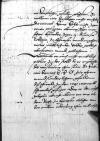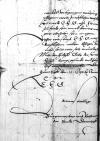Letter #876
Gdańsk Town Council to Ioannes DANTISCUSGdańsk (Danzig), 1542-04-11
Manuscript sources:
Auxiliary sources:
| ||||||
Text & apparatus & commentary Plain text Text & commentary Text & apparatus
Dem hochwirdigsten in Goth Fwrsten und Herrn, herrn
So will auch die gelegennheit erfurderen solchs dermossen zcu bessern, / das den vorschrtenn ordenungen / der gebuer und gelimph vor den ungelimph / widderummbe gelehstet werde / unnd zcweiffelen nicht. / Es werden Ewer Hochwirdige Gnade hierinne betrachten, / was vorhaltung und estimation einer ordenunng in einer stadt aber lande / von den einwonern zo ferne es in guttem regiment stehn soll gebuerenn / unnd wie solchs im fall der ubertrettung zcu remedieren unnd zcu bessren / sein will. / Wie sich auch Ewer Hochwirdige Gnade leichtlich zcuerinneren, was kurtz vorrugter zceitte als dem wol unnd grosgerichtem loblichen collegio, nemlich
Nhu wollenn wir zcu Ewer Hochwirdige Gnade der sicherenn unnd dinstlichen zcuvorsicht sein. Sie werde uns unnd dieser stath ordenunge / als desselbigen
Domit aber dennoch Ewer Hochwirdige Gnade zcu erfunde[n] hab, das wir derselbigen in allew[eg] zo viell uns immers möglich gerne dinstlichen gefallen gelehsten. / So wollenn wir derselbigen nicht vorhalten, das wiewol
Worummbe er auch nicht umbillich publice in der stelle do er angeloffen die vor sunug thun sulte. / So haben wir dennoch Ewer Hochwirdige Gnade zcur ehren unnd sunderlichem gefallenn diss thuendt in den wes (wie woll schwerlich) gefuget, das er den auffgelegten abtragk, / alleine vor uns als dem rathe in beÿwesen etzlicher von der andern ordtnung thun und also wandel der begangene vorletzung phlegenn werde in troestlichem vorhoff[ten].
Es werde Ewer Hochwirdige Gnade nhu hirann zcu friede sein / unnd ferners anregens uberhaben sein mogenn. / Whor(!) wir sunst Ewer Hochwirdige Gnade mith dinstlichem willen behagen konnen seint wir stetz unvordross[ten].
Mit der hulffe Gotts der Ewer Hochwirdige Gnade lange gesundt und szeliglich enthalten wolle. /
Datum
Ewer Hochwirdige Gnade diennstwillige




